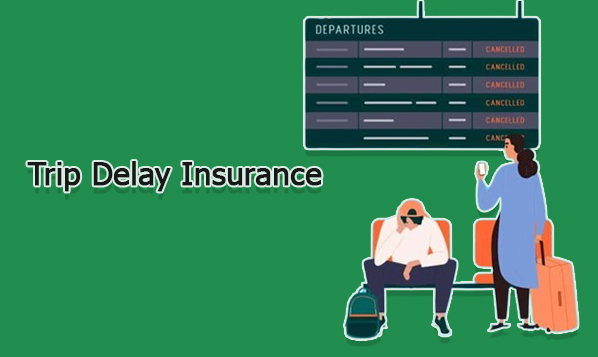Travel insurance packages offer significant benefits to mitigate potential financial losses resulting from unanticipated events. A delayed trip is one of these situations. Trip delay insurance partially covers costs incurred due to weather-related delays, aircraft maintenance issues, or emergencies.

Trip delay insurance also known as travel delay is a coverage that pays for extra costs if there are major delays brought on by uncontrollable circumstances. This coverage is included in policies, which cover meals, lodging, and transportation expenses. Some might also pay for non-refundable, pre-paid travel expenses.
Most travel insurance policies offer trip delay insurance at no extra cost, despite variations in coverage limits, eligibility requirements, and policy exclusions. In this article, we will discuss some necessary components of Trip Delay Insurance like how it works and what it covers and not.
How Does Trip Delay Insurance Work
Travel insurance benefits for trip delays usually commence after a predetermined period, which varies depending on the insurance plan. For instance, it may take six hours for your plan to begin paying benefits. Furthermore, the policy must list the reason for the delay as a covered reason.
Also, mechanical failure, bad weather, natural disasters, lost or stolen passports, and traffic accidents are common causes of travel-related accidents. There will be a daily benefit cap and a daily maximum benefit cap for trip delay insurance. The best travel insurance policies have a high level of reimbursement per person and only mandate a few hours of delay.
You may be eligible for reimbursement of reasonable expenses if you are delayed for a reason covered by your policy, up to the policy’s coverage limit. These costs could include transportation, lodging, and meals.
What Does Trip Delay Insurance Cover
Although trip delay plans vary, most of them reimburse necessary costs incurred as a result of a delay in travel. Trip delay insurance also covers delays caused by weather or other unanticipated circumstances, in contrast to airline policies that only cover delays under their control. Usually, coverage is restricted to a certain daily or trip-specific dollar amount.
The following purchases are frequently covered by trip delay insurance:
- Food.
- Accommodation.
- Medicinal care.
- Toiletries.
- Transportation to and from your lodge.
- Additional items for personal use.
Are all Trip Delays Covered By Travel Insurance
Travel insurance companies only cover major, unexpected delays, not all delays qualify for coverage. Before coverage begins, policyholders must be delayed for a minimum of hours under all trip delay insurance plans. Travel insurance policies have minimum delay requirements ranging from three to twelve hours.
Your insurance policy must not only cover the minimum delay required by your policy, but it must also cover the type of delay. Generally, the majority of plans will pay back passengers who are delayed for the following approved reasons:
- A common carrier breaking down mechanically
- Cancellations of flights
- A natural disaster, bad weather, or other severe weather events that have been documented
- Unexpected illness, injury, or death to you, a family member, or a travel companion
- Passports, visas, and other travel documents belonging to you or your travel companion are misplaced or stolen.
- Being involved in a traffic accident while leaving
Trip Delay Insurance vs. Trip Interruption
Delay protection is not the same as trip interruption insurance or cancellation coverage. The cost of a trip that you cancel before departure is covered by cancellation insurance. By covering the cost of transportation home or to your next location and compensating you for any unused portions of your itinerary, interruption coverage guards against major disruptions. Only the expenses incurred until your travel plans are resumed are covered by delay insurance, which is intended for temporary interruptions.
How to Make a Trip Delay Insurance Claim
Certain travel insurance providers, such as Allianz, offer easy-to-use mobile applications that facilitate the claims process. Also, doing it online or while on the go is simple. You should have your policy number and the details of your travel delay situation close at hand.
To file a claim, you will also need to provide your receipts. You can file a claim by visiting your insurer’s website if they don’t have an app or if you’re not tech-savvy. For more help, you can also give the customer service number a call.
Is Trip Delay Insurance Worth It
In the travel industry, cancellations and delays are frequent. About 20% of U.S. flights experienced delays in 2022, and 2.69% experienced cancellations. When these interruptions persist for longer than a few hours, delay insurance pays out. You can return to your itinerary immediately and maintain your travel budget due to this coverage.
The support and compensation you receive during a prolonged delay may vary depending on time limits and coverage amounts. To find the best insurance for your needs, you should investigate various travel insurance providers and obtain several quotes.

